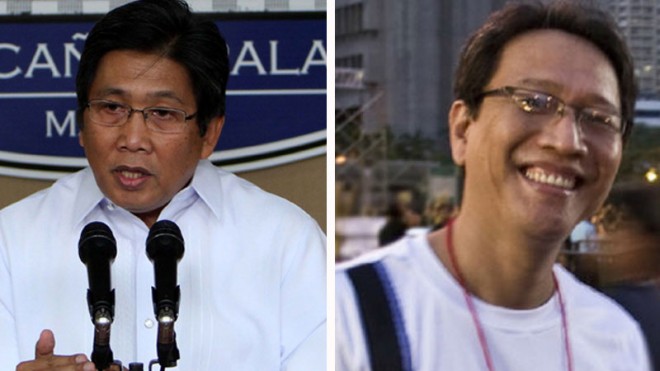
Communications Secretary Herminio Coloma Jr. (left) INQUIRER FILE PHOTO; Binay spokesman Joey Salgado PHOTO FROM SALGADO’S TWITTER ACCOUNT
Malacañang on Monday gave assurance that reform efforts would continue through the last days of the Aquino administration.
Disputing the observation of New York-based think tank Global Source, Communications Secretary Herminio Coloma Jr. said that “instead of slowing down on reforms, the President and the Cabinet are working to ensure the completion of vital infrastructure projects and priority development programs.”
Earlier, Coloma told the Inquirer that in its final year in office, the administration would “further improve the delivery of essential public services and the strengthening of public institutions” so that it could “build even stronger foundations for sustainable and inclusive growth and progress that would be its legacy to all future generations of Filipinos.”
Coloma said good government had become “the norm of public service” while “performance-based budgeting, the seal of transparency and performance enhancement incentives for government employees [had] become the hallmarks of open, transparent and accountable government.”
In a recent commentary on the Philippine situation as the term of President Aquino comes to an end, Global Source said reform efforts were “likely to slow to a crawl” as the administration headed “into its last mile.”
Global Source pointed to President Aquino’s skipping the freedom of information (FOI) bill in mentioning his priority legislation in his final State of the Nation Address to Congress on July 27.
Aquino mentioned the proposed Bangsamoro Basic Law (BBL), rationalization of fiscal incentives, antidynasty law, unified uniformed personnel pension reform bill and the 2016 budget, and spoke about the FOI bill only the next day.
“While we are confident that the President has enough influence over Congress to ensure the timely passage of the budget and Congress itself may want to support pensions for uniformed personnel, we are less optimistic about the other bills,” Global Source said.
“If ever, the executive (branch) may need to accept watered-down versions of its proposals, like what happened to the recently enacted Cabotage Law, which limited foreign ships’ cargo handling to those coming also from foreign vessels. The BBL, meant to be this administration’s legacy, remains controversial and difficult for legislators facing reelection to support,” the think tank said.
Continuity vs change
Global Source also observed that President Aquino, by endorsing Interior Secretary Mar Roxas as his successor, was recasting the 2016 presidential election as a vote for continuity of his administration’s “straight path” reform program.
“The tactic is a clever one intended to translate popular support for the President, who has managed to spring back from low ratings in the wake of the Mindanao crisis early this year, into votes for Mr. Roxas, who is lagging in presidential preference polls. If it succeeded in painting the other contender, Vice President Jejomar Binay, who is hounded by allegations of corruption, as one taking the ‘crooked path,’ so much the better,” Global Source said.
Commenting on that statement, Coloma said President Aquino was “calling upon the people to vote for the continuation of [his reform program] as well as for the further transformation of Philippine society instead of enmity and hatred between the rich and the poor.”
“Pursuing [reforms] involves national solidarity through inclusive policies aimed at reducing poverty,” Coloma said.
Presidential spokesman Edwin Lacierda said Global Source was “stating the conventional wisdom, which is no different from the standard framing of most pundits.”
“What is remarkable is they do recognize that for the first time in more than a generation, the Philippines has the opportunity to maintain its momentum by voting for continuity,” Lacierda said.
“For this reason, it also recognizes that the enemies of reform have coalesced because losing two presidential elections in a row could be fatal to their power and fortune, to the advantage of the Filipino people,” he said.
Oversimplification
Binay’s camp said Global Source “oversimplified the choice of the people” by saying that the 2016 presidential election would be a battle between continuity and change.
In a statement issued Monday, Joey Salgado, a spokesman for Binay, criticized the Aquino administration for pressing for continuity of policies that worked against the people’s interests.
“It’s not simply continuity versus change, but the continuity of policies that prejudice the poor and favors the rich; large-scale corruption involving Palace allies, and repression of the opposition and stifling dissent by using the powers of the government,” Salgado said.
According to Salgado, what the country needs is “change toward an economic policy that gives jobs and food for the poor; ensures greater transparency, accountability and equal
to the people.
application of the law regardless of political ties, and guarantees and protects the exercise of democratic rights.”
Salgado pointed out that Binay had said in media interviews that he intended to continue the “good policies and programs” of President Aquino, but not the policies that brought no benefits.
Among the administration programs that Binay would pursue, Salgado said, is the conditional cash transfer program, which hands out P1,500 to the poorest families every month in exchange for sending the children to school and to clinics for healthcare.
Salgado said, however, that Binay intended to purge the program of unqualified beneficiaries.
RELATED STORIES
Presidential race: Continuity or change